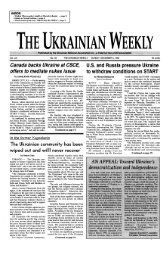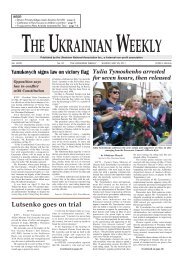1_January 6, 2002 - The Ukrainian Weekly
1_January 6, 2002 - The Ukrainian Weekly
1_January 6, 2002 - The Ukrainian Weekly
Create successful ePaper yourself
Turn your PDF publications into a flip-book with our unique Google optimized e-Paper software.
22 THE UKRAINIAN WEEKLY SUNDAY, JANUARY 6, <strong>2002</strong><br />
No. 1<br />
2001: THE YEAR IN REVIEW<br />
12 million <strong>Ukrainian</strong>s live abroad, dispersed across the<br />
globe for various reasons, including economic and<br />
political ones. He said they should be encouraged to<br />
return home or at least maintain ties with their historic<br />
homeland. It is probable that the bill, which cannot be<br />
resubmitted to the legislative body until its next session,<br />
will be reworked and reintroduced.<br />
In October a precedent-setting verdict was passed by<br />
Poland’s Supreme Administrative Court in a case over<br />
property confiscated by the state in 1949 from Maria<br />
Hladyk, a Lemko who was forcibly resettled in 1947<br />
from her home to a village in Poland. This verdict<br />
admits that the nationalization of Lemko properties 50<br />
years ago was illegal and paves the way for other<br />
Lemkos, or their heirs to regain what was confiscated<br />
from them by the Communist authorities. Polish courts<br />
are currently going over some 200 lawsuits by Lemkos<br />
seeking to have their properties returned to them.<br />
Finally, the compensation deadline for Nazi-era slave<br />
laborers was extended from August 11 to December 31<br />
of this year. During World War II, many Eastern<br />
Europeans were taken from their homelands by the Nazi<br />
regime to Germany and were forced to work in camps<br />
and factories. Last year the German Parliament voted to<br />
allocate funds to compensate the slave and forced laborers,<br />
who are found worldwide. <strong>The</strong> compensatory funds<br />
are supplied partly by the German government and partly<br />
by the corporations that participated in the forced<br />
labor program over 50 years ago. Most claimants are<br />
now between 70 and 90 years old.<br />
U.S.-Ukraine relations:<br />
signs of dissatisfaction<br />
<strong>The</strong> year 2001 had many indications of an improving<br />
U.S.-Ukraine relationship: Ukraine joined in the<br />
U.S. fight against international terrorism, improved<br />
its economy, maintained its security and other ties with the<br />
United States and NATO, and exchanged senior-level visits<br />
with its trans-Atlantic strategic partner.<br />
But the relationship was also dogged by a number of irritants:<br />
the unsolved, suspicious murder of muckraking journalist<br />
Heorhii Gongadze, allegations of pervasive high-level<br />
corruption, and the apparent official unwillingness to curb<br />
the large-scale production of pirated Western optical media<br />
products.<br />
<strong>The</strong>se irritants simply would not go away, and, as a<br />
result, the bilateral relationship ended the year with a notso-very-merry<br />
Christmas – Ukraine got a dreaded “rizka”<br />
(switch) instead of a present from the administration’s St.<br />
Nick and found a smaller present than expected under the<br />
Congressional foreign assistance Christmas tree.<br />
After two years of pressure, threats and limited action in<br />
its attempt to curb Ukraine’s role as Europe’s leading producer<br />
and exporter of pirated music, video and computer<br />
program products (CDs, CD-ROMs, DVDs, etc.) the U.S.<br />
government finally put its foot down – on December 20 the<br />
office of the U.S. Trade Representative (USTR) announced<br />
trade sanctions against Ukraine.<br />
Beginning on <strong>January</strong> 23, <strong>2002</strong>, the United States will<br />
levy “prohibitive tariffs” on $75 million worth of metals,<br />
footwear and other imports from Ukraine, which will offset<br />
the amount of annual damages that this piracy of optical<br />
media has caused to Americans, according to the announcement.<br />
<strong>The</strong> sanctions were announced on the same day the<br />
Verkhovna Rada again failed to pass anti-piracy legislation.<br />
Explaining the U.S. action, Trade Representative Robert B.<br />
Zoellick also suggested that Ukraine’s lack of action may<br />
hurt its chances of getting into the World Trade<br />
Organization. “We take piracy of U.S. intellectual property<br />
seriously. So does the WTO, which Ukraine wants to join,”<br />
he said.<br />
<strong>The</strong> United States had placed Ukraine on the priority foreign<br />
country watch list in March, and in August it stripped<br />
Ukraine of its status in the Generalized System of<br />
Preferences (GSP) which it grants developing economies.<br />
Within days of the USTR action on sanctions, the U.S.<br />
House of Representatives and Senate approved a compromise<br />
foreign assistance package for fiscal year <strong>2002</strong>, which<br />
would give Ukraine “not less than” $154 million. While<br />
more than the $125 million recommended by the House,<br />
the amount is less than the $169 million requested by the<br />
Bush administration and the $180 million that originally<br />
passed in the Senate. It is also less than the $170 million<br />
appropriated for Ukraine for 2001 and the $195 million it<br />
received in 2000.<br />
While the <strong>2002</strong> aid legislation directs the State<br />
Department to report to Congress “on progress by the government<br />
of Ukraine in investigating and bringing to justice<br />
individuals responsible for the murders of <strong>Ukrainian</strong> journalists,”<br />
unlike the “certification” provisions in previous<br />
years, this year’s provision does not threaten to cut off aid if<br />
the report is negative.<br />
<strong>The</strong> unsolved slayings of Heorhii Gongadze, as well as<br />
other lesser-known <strong>Ukrainian</strong> journalists reporting about<br />
high-level corruption, and questions of press freedom in<br />
Ukraine have been raised repeatedly throughout the year by<br />
the Bush administration and in Congress.<br />
<strong>The</strong> State Department’s annual Human Rights Report<br />
cited Ukraine’s mixed record on human rights and the government’s<br />
failure to curb institutional corruption and abuse.<br />
Administration spokesmen periodically expressed U.S.<br />
concerns in response to inquiries, and the U.S. position was<br />
driven home resolutely by National Security Adviser<br />
Condoleezza Rice during her visit to Kyiv on July 25. “We<br />
hope to have good relations with Ukraine,” she told<br />
reporters in Kyiv, “but it can only be on the basis of forward<br />
movement on these very important issues.”<br />
In Congress, the U.S. Helsinki Commission, which has<br />
always taken the lead in monitoring such issues, frequently<br />
expressed its concerns and held a special hearing on<br />
Ukraine. <strong>The</strong> commission’s chairman, Sen. Ben Nighthorse<br />
Campbell (R-Colo.), also introduced legislation that would<br />
tie foreign economic assistance to corruption-fighting<br />
efforts in countries that receive U.S. aid.<br />
During the hearing on May 2, dubbed “Ukraine at the<br />
Crossroads – 10 Years After Independence,” Helsinki commission<br />
members had a chance to quiz President Leonid<br />
Kuchma’s top national security advisor, Yevhen Marchuk,<br />
on Ukraine’s political and economic problems, including<br />
the tape scandal allegedly linking the president to the murder<br />
of Mr. Gongadze and to some high-level corruption, as<br />
well as the removal, a few days earlier, of Prime Minister<br />
Viktor Yuschenko, who had been highly regarded in the<br />
West as an incorruptible reformer.<br />
Mr. Marchuk said that the tape scandal and Gongadze<br />
affair “complicated” the political process and were being<br />
used by the president’s opponents “to instigate the political<br />
crisis in Ukraine.” On the other hand, he added, this societal<br />
friction could also be seen as a “natural component of a<br />
complex process of the maturing of the young <strong>Ukrainian</strong><br />
democracy.”<br />
Mr. Marchuk also took time to underscore Ukraine’s<br />
economic progress and positive role in international affairs<br />
– its track record on implementing undertaken commitments<br />
and the consistency of is foreign policy. He cited as<br />
examples the elimination of Ukraine’s nuclear weapons, its<br />
adherence to international arms control and non-proliferation<br />
regimes, and the closure of the Chornobyl nuclear<br />
power plant.<br />
Sitting in the audience in the hearing room was the slain<br />
journalist’s widow, Myroslava Gongadze, and their two<br />
young daughters, who had been granted asylum in the<br />
United States.<br />
Maj. Mykola Melnychenko, the presidential bodyguard<br />
who secretly recorded president Kuchma’s conversations,<br />
had an opportunity to explain his side of the taping controversy<br />
during a Washington news conference on August 14.<br />
He received asylum in the United States at about the same<br />
time as Ms. Gongadze; the U.S. action was revealed by the<br />
State Department on April 16.<br />
Maj. Melnychenko said he doubted that President<br />
Kuchma would ever resign over the tape scandal. But he<br />
was certain that sooner or later the president would be<br />
brought to account for the killing of Mr. Gongadze and<br />
other crimes. He denied press reports that he was helping<br />
U.S. investigators looking into <strong>Ukrainian</strong> money-laundering<br />
activities in the United States and that he gave them<br />
access to the tape recordings.<br />
Questions about the presidential tapes, the Gongadze<br />
murder and corruption were also discussed to a greater or<br />
lesser degree in many of the official and unofficial visits to<br />
Washington by <strong>Ukrainian</strong> political figures in 2001.<br />
<strong>The</strong> first such visit, at the end of February, was by<br />
Socialist Party leader Oleksander Moroz, who had received<br />
copies of some of Maj. Melnychenko’s secret tapes, played<br />
some of them publicly and launched his movement to oust<br />
President Kuchma. He said he came to Washington to get<br />
acquainted with the personalities in the new Bush administration<br />
and to give them his perspective on developments in<br />
Ukraine.<br />
Among other <strong>Ukrainian</strong> political figures on similar missions<br />
to Washington at this time was former Foreign Affairs<br />
Minister Borys Tarasyuk, who held a round of meetings at<br />
the State Department, the National Security Council and on<br />
Capitol Hill, but unlike Mr. Moroz, shied away from publicity<br />
and the press.<br />
Also making the rounds of the Washington power centers<br />
in March was Serhii Tyhypko, another former member<br />
of the Yuschenko Cabinet, who, also unlike Mr.<br />
Moroz, said that absent clear evidence of the president’s<br />
complicity to criminal activity he would back Mr.<br />
Kuchma. Mr. Tyhypko also indicated that Prime Minister<br />
Yuschenko needed to strengthen his government with a<br />
broader coalition.<br />
As it turned out, a few weeks later Mr. Yuschenko, lacking<br />
adequate support in the Verkhovna Rada, was ousted on<br />
a no-confidence vote. Already out of office but not out of<br />
politics, Mr. Yuschenko came to the United States in<br />
November as the head of a new election bloc, Our Ukraine,<br />
which is preparing for elections to the Verkhovna Rada in<br />
<strong>2002</strong>. While in Washington and New York, he met with<br />
administration officials and members of Congress, business<br />
leaders, the press and the Council of Presidents of major<br />
Jewish organizations.<br />
<strong>The</strong> first high-level <strong>Ukrainian</strong> official to meet with the<br />
new administration in Washington was First Vice-Prime<br />
Minister Yurii Yekhanurov. <strong>The</strong> primary objective of his<br />
mid-March visit was to secure additional credits from the<br />
International Monetary Fund and World Bank, but it also<br />
included meetings with Treasury Secretary Paul O’Neill<br />
and other U.S. officials.<br />
Two weeks later <strong>Ukrainian</strong> Foreign Affairs Minister<br />
AP/Efrem Lukatsky<br />
U.S. Reps. Marcy Kaptur, Curt Weldon, Bob Schaffer and Andrew Crenshaw on February 22 during a visit to<br />
Kyiv for discussions on the current political situation in Ukraine and cooperation with the Verkhovna Rada.

















